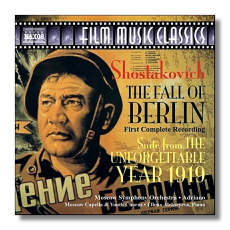
The Internet's Premier Classical Music Source
Related Links
- Shostakovich Reviews
- Latest Reviews
- More Reviews
-
By Composer
-
Collections
DVD & Blu-ray
Books
Concert Reviews
Articles/Interviews
Software
Audio
Search Amazon
Recommended Links
Site News
 CD Review
CD Review
Dmitri Shostakovich

Film Scores
- Film Score "The Fall of Berlin", Op. 82 (arr. Adriano)
- Suite from the Film Score "The Unforgettable Year 1919", Op. 89a (arr. Lev Atovmian)
Ellena Alekseyeva, piano
Moscow Cappella & Youth Chorus
Moscow Symphony Orchestra/Adriano
Naxos Film Music Classics 8.570238
The Fall of Berlin is ap remiere recording of what is more or less the complete Shostakovich film score, with a few touches by Adriano. The Unforgettable Year 1919 is billed as the first complete recording of the Suite from the film score assembled by Lev Atovmian. In both instances, the word "edited" is used on the back cover to describe the version of the respective score, though I chose to call it an arrangement, which I think is more accurate. In any event, both scores are rarities from a major composer in a genre in which he scored mixed results.
My verdict on the merits of a recording usually comes at the end of my reviews, but I want to get that duty out of the way now, so I can address the obvious and more pressing questions raised by the issue of this unusual CD, especially those cited in the accompanying notes – extremely thought-provoking and detailed notes by the conductor here, who is also a composer himself and who goes only by his surname, Adriano. Suffice it to say then that the performances are fine and production values and sound quality excellent. Shostakovich and film music buffs will want this recording – so I enthusiastically recommend it. Anyone not wanting to explore deeper and more controversial issues can stop reading here.
Adriano, while generally fair and accurate in his notes, understandably has a bias for Shostakovich and he reflexively defends the Soviet composer's music when it ostensibly appears supportive of Stalin and his regime. But the defense he often seems to put forth is an increasingly familiar, tenuous one among Shostakovich's admirers:Shostakovich must be credited for the good music here and the oppressive meddling criminal, Joseph Stalin blamed for the bad. There may well be some truth to this assertion, but the problem with it is this: while Soviet composers active after 1936 may have had party censors, including Stalin himself, looking over their shoulder, they cannot use that unfortunate circumstance to justify bad music – and there's a measure of bad music here, the kind of stuff reeking of bombast and cliché. Just try – as Adriano points out – the last two cues in The Fall of Berlin, "Stalin at Berlin Airport" and "Finale: Stalin's Speech… "
One can certainly sympathize with the dreadful conditions that Soviet artists endured under Stalin, but we must remember that Prokofieff wrote highly-successful film scores – Alexander Nevsky and two parts of Ivan the Terrible – when Stalin was actively meddling in the arts. Prokofieff's music was far more daring and far more inventive than Shostakovich's, so I'm not sure to what extent one can blame Stalin for the weaknesses in The Fall of Berlin and, for that matter, in The Unforgettable Year 1919. I don't want to create the impression that these film scores are weak efforts – they have much attractive music, music colorfully orchestrated and likeable upon first hearing. The Unforgettable Year 1919, for instance, contains a catchy sort of mini-concerto for piano and orchestra, dubbed here "The Assault on Red Hill", but previously known as "Assault on Beautiful Gorky". It's light and has a crossover appeal, akin to Addinsell's Warsaw Concerto, with a dash of Tchaikovsky from Roméo and Juliet thrown in. It is quite convincingly performed, too, by pianist Ellena Alekseyeva, though the keyboard writing doesn't sound particularly challenging. At any rate, many listeners will find the music in both scores quite to their liking, but little of it carries the depth found in the composer's better symphonies and most of his quartets.
Copyright © 2006, Robert Cummings




















